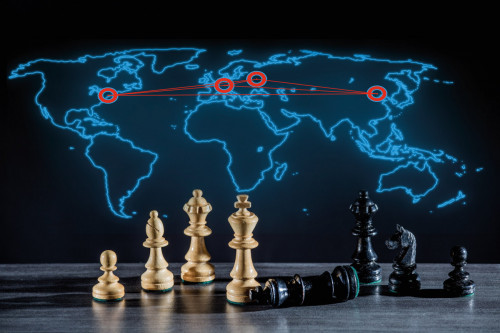I would like the title chosen for this edition of my column to be understood more as a question with an exclamation mark, especially with regard to new materials. Especially in the field of organic circuit carriers, I am missing new materials and their development. Some will say: "Wait a minute - there are some". That's true, but it begs the question: Where do they come from? Whose song is being sung there? Is there still a major basic material manufacturer for polymer circuit carriers with real innovation potential and with its own research and development in Europe or in Germany?
In my opinion, this has always been - and would still be in the future - essential for the independent and healthy further development of one's own company and an entire value chain. But at the moment, we are all too often on a one-way street in this respect, if not a dead end. Current global political events underline this more than clearly.
 Healthy independence in production should become an important strategic goal in the industryLet's turn to the second part of the title in search of answers. In recent years, enormous progress has been made in the area of structuring and partial resolution, particularly in the field of packaging technology. As so often in the past, the semiconductor industry has been the driving force. The attempt to bring the world of inorganic chips and the organic world closer together has so far only been partially successful. Many things are now technically feasible. Solutions have already been demonstrated in large numbers - especially by institutes such as the Fraunhofer IZM in Berlin. So far, so good.
Healthy independence in production should become an important strategic goal in the industryLet's turn to the second part of the title in search of answers. In recent years, enormous progress has been made in the area of structuring and partial resolution, particularly in the field of packaging technology. As so often in the past, the semiconductor industry has been the driving force. The attempt to bring the world of inorganic chips and the organic world closer together has so far only been partially successful. Many things are now technically feasible. Solutions have already been demonstrated in large numbers - especially by institutes such as the Fraunhofer IZM in Berlin. So far, so good.
However, it would appear that the establishment of so-called heterogeneous system integration or heterointegration is still failing due to the unwillingness of individual major players in the value chain to cooperate. After all, this always means taking a risk, which seems to be one of the biggest problems here.
The challenge here seems to be finding a production company that, on the one hand, has the will to break new ground and, on the other, is able and willing to bear the financial risk. And to do so in their own environment and region. You could also describe this as a 'genuine drive for innovation in the field of electronics and its products'.
Here I would like to highlight a single example today, to which the frequently used slogan 'Beyond ...' perhaps applies - quite specifically as 'Beyond Standard PCB': the number 15 on the list of the world's largest PCB manufacturers is taking precisely this one step further in its home country - and thus a challenging path. AT&S is investing € 500 million in a new production facility for organic circuit carriers in Austria. This is an absolute ray of hope in the industry.
The cooperation with Intel and the investment of around € 500 million in a production facility in China several years ago have taught us a lot. The consequence of this is to build up our own independence and strengths again, independent of many economic and political 'games' and constraints. In view of the critical situation in mainland China and Taiwan, this is a must and a step with real foresight, it seems.
I already touched on the topic of energy in my last column [1]. Recycling will or should increasingly take place at home again and not be outsourced to low-wage countries. So let's move away from the 'leaf blower syndrome': you don't solve problems by blowing them somewhere else and then trying to dictate to others. That no longer works. Africa is now also divided into new interest and economic zones. And if you take a closer look, Europe and North America are no longer number 1 here either.
What needs to be rebuilt are the supply chains and local production in Europe. That won't be cheap. And at this point, another key issue needs to be addressed, which is particularly relevant in Germany: SMEs - which are struggling in the current globalization business.
Where are the new materials for new concepts in assembly and connection technology actually produced?
This is a point that needs to be clarified: although the chemical giants are right on our doorstep, they only focus on the big business of tons and tons. Glyphosate and its forced collectivization are currently the most profitable. Until China and Russia will also pursue their own strategy here - certainly also in Africa.
All those who, even before the pandemic, had based their strategy on more trade and less domestic production as well as on 'eastward expansion' should perhaps have seen the light by now or have already seen the light.
You can also look at it this way.
We can be curious.
Kind regards
Jan Kostelnik
www.tebko.de
Sources:
J. Kostelnik: PlattenTEKTONIK, Energiewende und Klima - brauchen wir neue AVT-Stragien?, PLUS, 5(2022), 699-701, Eugen G. Leuze Verlag,


